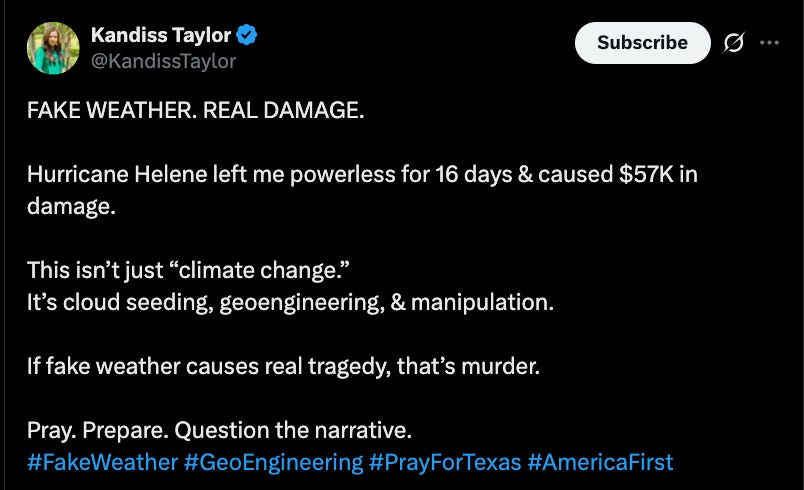How ‘Fake Weather’ Rhetoric Signals the GOP’s Deepening Embrace of Pseudoscience
Kandiss Taylor’s claims about manipulated weather exemplify how Republican elites now mirror the anti-factual passions of their base.
In a series of social media posts today, Kandiss Taylor, a Republican congressional candidate, Georgia GOP county chair, and former gubernatorial hopeful, declared hurricanes, floods, and weather crises to be “fake.” She blamed manipulation rather than natural forces for catastrophic events. Her comments echo longstanding conspiracy theories about weather control and highlight how deeply misinformation and pseudoscience have permeated Republican Party leadership.
From Fringe to Mainstream: Taylor’s ‘Fake Weather’ Claims
Taylor’s posts today began with a stark assertion: “Fake weather. Fake hurricanes. Fake flooding. Fake. Fake. Fake.” She went on to explain that “whack weather patterns creating crisis that are portrayed to be natural and real” are actually the result of human manipulation, describing them as a “fake progression, not natural.”
Later in the day, she defended herself by accusing detractors of twisting her words. She insisted that everyone should “ask questions” and “hold people accountable,” framing her comments as a stand for freedom and child safety. This has been a recurring theme in her political rhetoric.
Republican Elites and Their Base Now Aligned
Taylor has previously attracted attention for her flat Earth beliefs, anti-vaccine stance, and denial of the moon landings and 9/11. Her comments today illustrate a broader transformation in Republican politics. What was once dismissed as fringe or tolerated cynically by party elites has become indistinguishable from their own talking points.
In decades past, Republican leaders often courted conspiracy-minded voters while maintaining plausible deniability. Today, the distinction between elite and base has largely eroded. Lawmakers and candidates now promote the same pseudoscientific and emotive narratives their supporters embrace. They are no longer merely pandering but participating fully in the culture of anti-factualism.
The Power and Risk of Emotive Demagoguery
Taylor’s language reflects the emotive, apocalyptic tone that resonates with segments of the GOP base. It promotes a narrative of betrayal, manipulation, and looming catastrophe. While potent at mobilizing support, this rhetoric undermines public trust in scientific expertise, democratic institutions, and evidence-based discourse.
The shift reveals a party culture that resists facts, experts, accountability, rationalism, and empiricism. These values were once championed even by conservative thought leaders. The political payoff of fearmongering and disinformation, which critics describe as irresistible to some audiences, has entrenched these tactics as a durable feature of Republican strategy.
Beyond Taylor: Why It Matters
Taylor’s remarks today are not just the musings of an eccentric politician. They expose a broader reality, with the Republican Party increasingly aligned with conspiratorial thinking. This cultural transformation raises urgent questions about the party’s ability to engage with evidence-based policymaking and its implications for public safety, environmental resilience, and social cohesion.
As Taylor herself put it: “Our job is to protect our freedoms and keep our children safe.” But when such goals are pursued through misinformation and emotive demagoguery rather than facts and expertise, both freedom and safety risk becoming casualties of the political spectacle.




